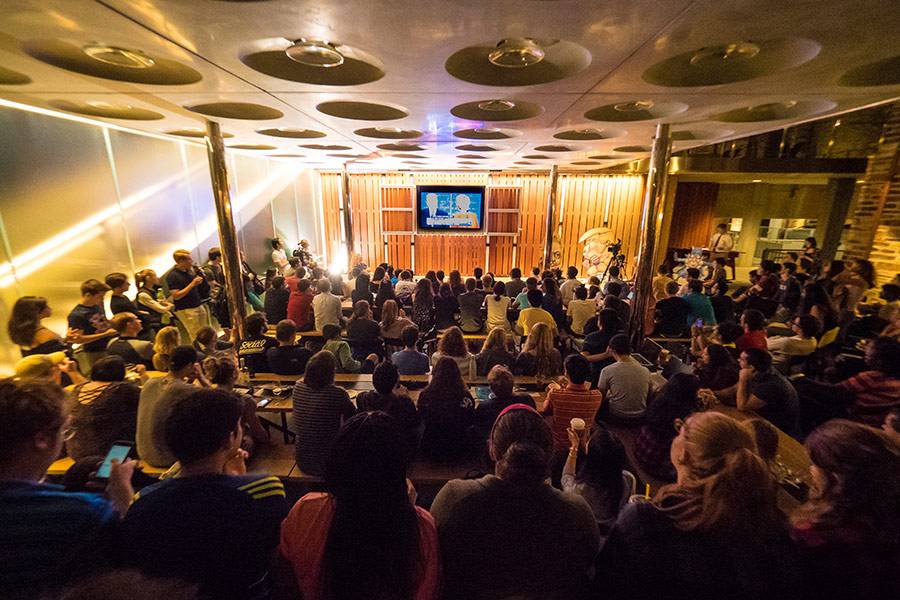Reaction From the Duke Community During and After the Presidential Debate

Several Duke faculty say they don’t think either presidential candidate in Monday’s highly anticipated first debate won hands down, but they believe Democrat Hillary Clinton came across as more presidential than her Republican opponent, Donald Trump.
“In a historically polarized electorate, with most people certain of their vote, the question on the table was: ‘What exactly were the candidates trying to accomplish with this debate?’” asked Kristin Goss, associate professor of public policy and political science and director of the Duke in DC program.
“One obvious answer is to sway Republican and Republican-leaning women, especially those who would never dream of staying home on Election Day but don’t know what to do this year. Clinton needed to reassure these women that she’s a palatable choice, and that Trump really is ‘that guy’ whom every woman above a certain age has had to deal with in a business meeting or as a customer. I think she helped her cause. I don’t think he helped his.”
Earlier CNN called this the most important political event in American history. Let's see if it tops the Civil War #DukeDebateWatch
— Nick Carnes (@Nick_Carnes_) September 27, 2016
Trump now officially screaming. It took 24 minutes for @HillaryClinton to get under his skin #DukeDebateWatch #Debates2016
— Robin Kirk (@RobinKirk) September 27, 2016
Clinton’s challenge was to convey her policy skills without becoming too “wonkish,” and to show a steadiness that would help build trust as president to offset doubts based more on her reputation for political maneuvering, said Bruce Jentleson, a professor of public policy and political science.
“The general reaction thus far is that she did this well. Pundits largely gave her the win, markets went up right away -- Dow Futures, various international stock exchanges. Whether swing voters in swing states moved toward her is as yet unclear, and in many respects the crucial factor.”
Jentleson said Trump needed to convey presidential competence both in terms of command of the issues and temperament for the office.
“He hit his notes on trade, and that may have resonated with some swing votes/swing states. Polls later this week will give some indication. But he did far more reverting to repetitious and meandering rhetoric than showing the knowledge of issues that would be needed to be the change agent he styles himself as.”
This was especially evident on foreign policy and national security issues, Jentleson added.
Political scientist Peter Feaver, who formerly worked as a national security adviser to Presidents George W. Bush and Bill Clinton, wrote in a Foreign Policy blog Tuesday that neither candidate committed a major new foreign policy gaffe -- “just, alas, a bunch of old familiar ones.”
But the debate didn’t offer much insight into “how either candidate would handle the dangerous legacy of international instability one of them will inherit on Jan. 20, 2017.”
“The most interesting foreign policy question was the last one on no first use” of nuclear weapons, Feaver wrote. “President Obama is flirting with a very risky policy to undermine U.S. deterrence by pledging no-first use. Trump was asked about this and gave an ambiguous answer that seemed both to promise no-first use and to insist that he would not take any capability off the table.
“Clinton avoided the question about no first use, preferring to make a different -- but important and worthwhile -- point that the United States could be trusted to honor its treaty obligations. (Moderator Lester) Holt did not press her to answer on no first use.”
"Words matter, and words really matter when you run for President." -@HillaryClinton #DukeDebateWatch
— eileen chengyin chow (@chowleen) September 27, 2016
Loved the whip of the finger when he says "against my lawyer's wishes." #dukedebatewatch
— Connel Fullenkamp (@ConnelFullenk) September 27, 2016
How the candidates addressed race was the most compelling part of the 90-minute debate for Deondra Rose, an assistant professor of public policy with a secondary appointment in the Department of Political Science.
“I think one of the most interesting points was to note their different conceptualization of race,” she said. “Hillary was asked if police deal with an implicit bias. She said not only yes, but we all do. I feel it demonstrated she’s really in tune to cutting-edge thought and research on the issue, which I found pretty refreshing.”
Trump’s assertion that black Americans are living “in hell” only holds true for some segments, such as in South Chicago, Rose said. Trump used the traditional Republican playbook to stir up people’s anxieties, she added.
“I think there was a lack in that answer of intersectionality -- not all black people live in that type of hell,” Rose said. “I think it says something about his team and the people who help him prepare.”
Trump either totally did or did not support war in Iraq. #DukeDebateWatch
— Jack W Boyd (@ashtangi2011_w) September 27, 2016
Pope “Mac” McCorkle, a veteran Democratic strategist who’s now an associate professor of the practice at the Sanford School, said Trump “clearly lost the debate.”
“His performance was unprofessional and un-presidential," McCorkle said. “Trump thereby lost an opportunity to gain some real momentum from the slow slippage of support from Secretary Clinton in North Carolina and elsewhere.
“Last night's debate did not change this deep division in our state. Although he squandered his opportunity last night, Trump will continue to have time to pick up even more momentum in our trade-devastated small towns and rural as well as our white exurban areas.”
McCorkle added: “The Clinton forces will continue working hard to get every possible ‘metro’ voter, especially young and minority ones, to the polls. Then both sides will probably just have to hope and pray about what the small number of truly undecided voters who don't like either candidate decide to do.”